




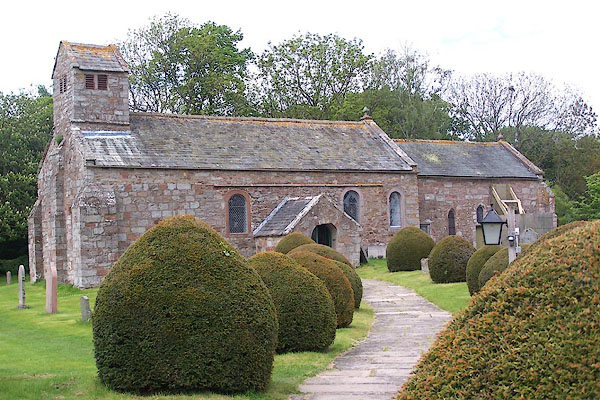
BME03.jpg (taken 30.5.2006)
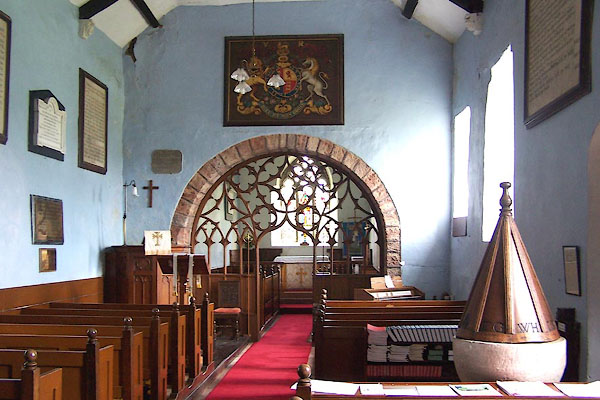
BME04.jpg (taken 30.5.2006)
placename:- All Saints Church
"All Saints Church (Per Curacy) / Grave Yard"
placename:- Bolton Chaple
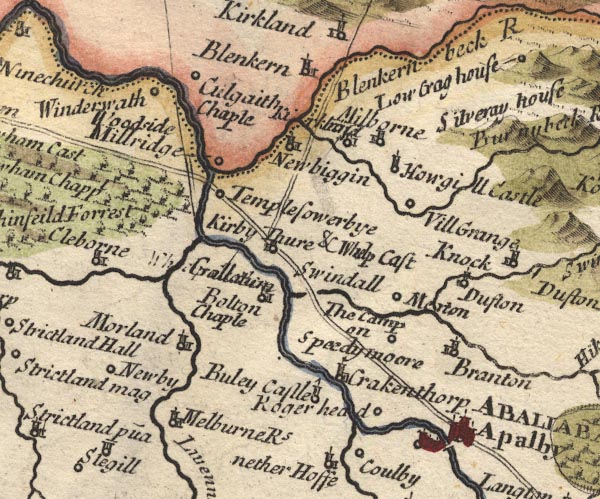
MD10NY62.jpg
"Bolton Chaple"
Circle, building and tower.
item:- JandMN : 24
Image © see bottom of page
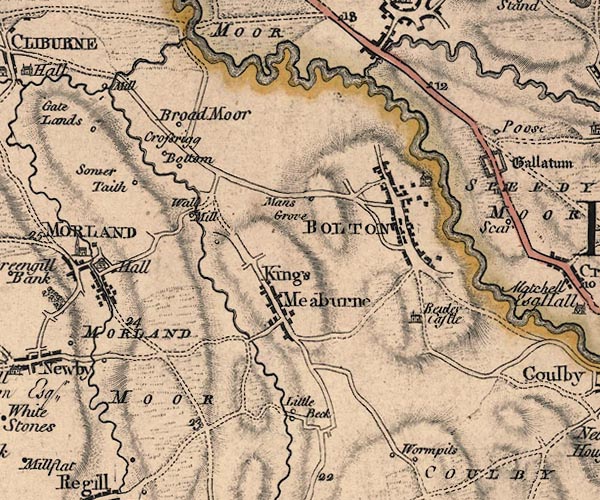
J5NY62SW.jpg
church
item:- National Library of Scotland : EME.s.47
Image © National Library of Scotland
 goto source
goto sourceGentleman's Magazine 1780 p.373 "Mr. URBAN,"
"TO remove the perplexities in which your anonymous correspondent, p.131, finds himself involved by the carving and inscription at Bolton, you will please to inform him, that there is nothing uncommon in the figures, either of the men or horses, as represented in his friend's drawing, admitting it to be a faithful one, which may perhaps be doubted. If time has not made the figures ruder than the carver or draughtsman formed them, he need go no further then the famous tapestry of Bayeux for their parallels. He will there find the same pointed helmets, oval shields, indented banners, stirrups not growing out of the horses bellies, but affixed to the saddle. The inscription is composed of the same kind of letters. The crosses are prefixed to it as in all of this and earlier as well as later periods. In that at Kirkdale (Arch. V. p.188, Pl.IV.) we see the cross at the beginning of different sentences, and at the end of the whole. That the language of our inscription is Saxon appears from the first letter Ð, which probably is followed by a single expressing ER. Lurren de may be luffende living: weredun, ƿerðn, werdun, were. dns Hugo miles de Boeltun."
"ÐER LYFFENDE ÞEREDVN DNS HV. . MLES DE BOELTVN."
"This may be one sentence; and this conjecture may or may not be right: but futher this deponent saith not, except that the last two words of the remaining part resemble the two first of the preceeding. Dr. Burn cannot help us out; for he goes no further back than the time of Edward II. A corrector copy might clear its own way: but the present may prove a Gordian knot to T. Row or Maister Somerset."
"... ..."
placename:- Bolton Chapel
 goto source
goto sourceGentleman's Magazine 1780 p.130
 click to enlarge
click to enlargeG780E01.jpg
 click to enlarge
click to enlargeG780E02.jpg
"These figures are carved upon a stone joining to the Inscription as in the plate."
"The size of these two stones is not specified, any more than the time when they were first noticed; and, whether owing to any accident, as plaister falling off, it seems, however, to be quite a modern discovery, as Dr. Burn, whose History of Cumberland was published in 1777, mentions nothing of it."
"This Inscription is on a stone above the old door-way, on the outside of the North wall of the Chapel of Bolton."
"The characters and points are both exactly represented."
"The places marked [hash] are convex; where probably some letter or letters are defaced."
"And those marked ---- are long spaces; where no characters appear."
"Bolton Chapel stands in the parish of Morland, about four miles North of Appleby, to which it is adjoining, on the Western bank of the river Eden, in Cumberland."
 goto source
goto sourceGentleman's Magazine 1780 p.131 "Mr. URBAN,"
"A FEW days ago I receieved the annexed sculpture and inscription from a good friend at Lancaster, who hoped that I might be able to throw some light upon it; which, I frankly own, I am not able to do: but as others may be more fortunate, to them I recommend it through your channel; and if it may save them some trouble, I will just mention what has occurred to them on the subject. To begin with the Carving; which one would expect would speak an universal language, and consequently be readily made out; which is not, however, the case, at least with me. I see two combatants, seemingly cased in armour from head to feet; the helmets of both are remarkably pointed at top; and both plainly have stirrups, which seem to grow out of the belly of the horses, without any the least appearance of stirrup-leathers. The horses too of both seem compleatly cased in leather at least, as they exhibit no eyes, mouths, ears, or manes: but as their tails too seem equally covered, (looking more like those of large rams) perhaps the uniformity of their whole appearance should be charged to the badness of the carving: though I think not, no more than to being worn smooth by time and weather: the stirrups might be fastened to this case or shell. One bears on his left arm an oval shield, which, I believe, is an uncommon shape: his right hand is raised level with his shoulder, and he pushes a tilting spear (I venture to call it so from its swelling bigger in the middle) into the neck of his adversary, who lifts up his left hand, and lowers the banner in his right hand; both seemingly in token of yielding. It is observable that there is no appearance of his having a shield; nor has his banneret any apparent head or spike to it, and the staff is uniformly slender throughout. This, one should suppose, was the representation of some formal combat: but in these it was usual to be very exact in seeing that the combatants arms were the same in size, &c. and from the cut or indented shape of the banneret, we must conclude, that it is the Gonfannen or Ecclesiastical banner: such, I supose, was St. Cuthbert's, at Durham; which, besides appearing in processions, was sometimes advanced against the Scots, with good success: but if so, this must be the champion, Vower, advocate or avoué of the church in some dispute; and that the fight should refer to somewhat of this kind , is natural enough to think, from the place where it is fixed. But we may well wonder why a defeat of a son militant of the church should be represented."
"If I have made but little out of the carving, I am afraid I shall come off still worse with the inscription. In it I observe two crosses, + +. Combatants crossed themselves before they began to engage; and children before they ventured upon their A B C, hence called the Christ's-cross-row, and the sign of it is still prefixed as a mark or direction to them in their hornbooks."
 click to enlarge
click to enlargeG780E03.jpg
"if the first word of the 4th line ends like justitie, maestitie, tristitie, &c. are employed in this short inscription. The two first words, as I venture to call them, seem exceedingly like those that compose the last line; except a final horizontal stroke in the middle of a perpendicular stem of the 1st letter, which, perhaps, was not visible in the correspondent one of the last line, or was over-looked. If it ought not to be at all in the first letter, then one might read DominuS LVR RENDE WERE DVN ASHVM MILES DE BO ELTYN. Ð the first letter may be supposed to be the Saxon Ð; but that is, I believe, always formed with a stroke of equaly length on both sides of the perpendicular one; which is not so here; and if it was, no more insight into the meaning is gained."
"Mr. Burn, in his History of Cumberland. p.454, informs us, that Boeltun was one of the four ancient ways of writing Bolton. If it should be thought that the copy doth not justifying supposing that more than a single letter is wanting in M E S, we should consider that it might be wrote L E S: the I being included in L, either thus [L with a stoke] or thus"
 click to enlarge
click to enlargeG780E04.jpg
"differing only in length. But a still greater difficulty with me, is the knight's being loaded with three names, at a time when very great people had often no more than a short"
 goto source
goto sourceGentleman's Magazine 1780 p.132 "monosysllable, as Grip, Girt, &c. If we go another way to work, and suppose the first letter to be an E, then, considering that not only the next parish church of Appleby is styled in record, Ecclesia Sti Laurentii de Appleby; and that the parish church of Morland, in which parish our chapel stands, is dedicated to the same saint; Burn I, 443 (though our chapel is to All Saints; see Ecton's Valor) we might be tempted to read Ecclesia DE S LaVRRENDE, the last letter but one being a mistake for C or T; or else should be separated, and form DE: but neither doth this satisfy; for though I have turned over Mr. Burn's two volumes very carefully on this occasion; in which there are some thousands of persons and place names mentioned, yet I can find none that one can suppose to be here meant. Nor doth the Baronetage article, Lorraine of Northumberland, afford any variety of assistance, Mr. Burn mentions, vol. I. p.51. Estate of Loring, and Sir Nigel Loring, vol. I. p.153, but he has no Weredun, or Verdon; but Warton, Wartun, Wherton, Quherton, pp.1, 11, 12, 36, 39, 41, 62, 234, 264, 558. There is said to be a Wardon or Wardrew iin Northumberland. Heylin's Help to History, p.436, No.114, barely mentions a Baron Verdon, who is probably no more ours than his Baron Leidurne; p.445, No.275, has any thing to do with the middle of our 5th line. Mr. Burn has a Laborne, v.i. p.143, 144, and he likewise informs us, Cumb. I, p.420, that Axham was anciently wrote in the most authentic instruments ASCYM or ASCOM. But our H is so remarkably large and plain, that it cannot be mistaken for a K. To go on, I cannot desire anybody to read AnnO A A Reparata S a lute; as I see nodate, except CV be one, and M omitted. The middle word of line 4th, if other things conspired kindly, might tempt one to read MVRum, to commemorate the building of the very wall, as hanc fenestram fecit, &c. Burn I, p.75. The fifth line, if an Antiquary could be other than a sad creature, he would think for Lilliburlaro; and that the usual ORATe prO a Ni M, was intended to follow. But when in so many suppositions not a single one seems plausible, it is time to give up, and express one's wishes, that others may only not be misled by any thing here said, as perhaps they would have done better, if left entirely to themselves, instead of being put on a wrong scent; and I assure them, when they make all clear, as they will do, who settle the reading rightly and truly, that I shall be pleased to see how easily and luminously they proceed on, where I could not see a step before me, nor even where I was."
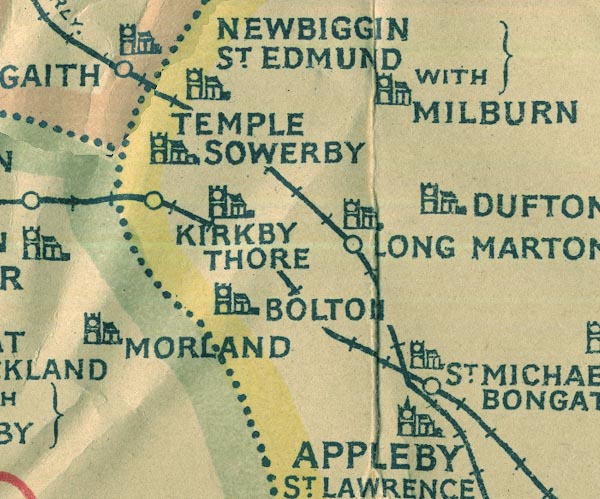
NUR1NY62.jpg
"BOLTON"
item:- JandMN : 27
Image © see bottom of page
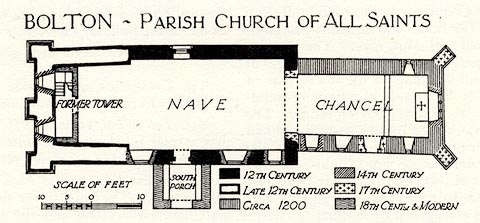 click to enlarge
click to enlargeHMW032.jpg
On p.43 of the Inventory of the Historical Monuments in Westmorland.
printed, top "BOLTON - PARISH CHURCH OF ALL SAINTS"
RCHME no. Wmd, Bolton 1
item:- Armitt Library : A745.32
Image © see bottom of page
 stained glass
stained glassplacename:- Church of All Saints
courtesy of English Heritage
"CHURCH OF ALL SAINTS / / / BOLTON / EDEN / CUMBRIA / I / 73283 / NY6393323412"
courtesy of English Heritage
"Parish Church. C12 and C13 with later alterations; restored in 1848. Coursed, squared rubble with buttressing to east and west end. Graduated slate roofs (chancel lower) with stone copings and C17 apex finials; gabled bellcote to west end. 2 cell plan with former west tower now opened up to form part of aisleless nave; original nave string-course visible above gabled C18 south porch. C12 south door has single roll-moulding to semicircular head with rosette decoration to hoodmould. One jamb shaft survives. Each capital has a chip-carved abacus with a low-relief figure to the side; the left hand capital has scallop decoration, the right-hand one is moulded (possibly recut in C13). Partly blocked north nave door is similar with cushion capitals and billet ornament to hoodmould, but lacking both jamb shafts; 2 contemporary carved stones are set in the wall above, one depicts 2 knights jousting and the other bears a badly weathered inscription. On south side, single C18 window with semicircular head to left of porch and 2 similar to right, all diagonally leaded. Narrower chancel has square-headed C14/C15 window and 2 lancets, of which the second has had its sill raised to accommodate a square-headed C17 doorway; single C12 slit window, near east end in both north and south walls. 3-light east window is largely C19 under C14 pointed hoodmould. At west end, dogtooth ornamented trefoil heads to single-light windows on either side of central buttress originally formed a C13/C14 quatrefoil panel. Internally, plain semicircular C17 chancel arch has C19 traceried screen infill. Hemispherical font on square pedestal with chamfered base and capital has conical, ribbed, wooden cover initialled and dated T.G. W.H. 1687. Fastened to wall on east side of door is wooden poor box with dated inscription (now partly painted out) "1634 The pour mans box and churchwardens seat". Some re-used C17 panelling at west end with gallery above. Various commemorative wooden panels on nave walls give details of benefactors; an C18 memorial stone fastened externally to the south wall of the chancel records the gifts of James Hanson and his wife to the village school. A badly weathered C14 tomb effigy is set in the south wall of the nave to the left of the porch."
courtesy of English Heritage
"BOWNESS TABLE TOMB IN CHURCHYARD TO SOUTH OF CHANCEL / / / BOLTON / EDEN / CUMBRIA / II / 73284 / NY6395223413"
courtesy of English Heritage
"Table-tomb with square corner supports. Inscription badly worn but small brass plate affixed near bottom of slab reads "Obit William Bowness December 11th 1767 Aged 82; Mary his Wife June 27th 1763 Aged 73. He gave in his lifetime Fifty Pounds to the School of Bolton." Table-tomb itself probably that of another William Bowness; a panel inside the church records that, in his will (dated February 9th 1709), he left "... an annual rent of ten shillings to be distributed upon his tomb stone to the poor of Bolton ... on the feast of Saint Thomas the Apostle yearly for ever.""
item:- knight
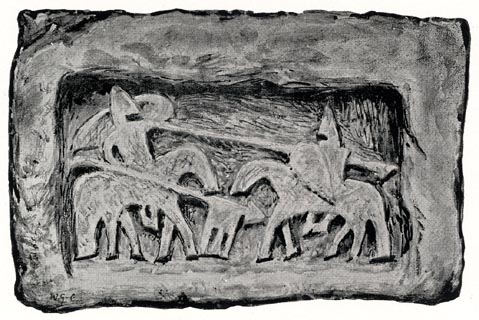 click to enlarge
click to enlargeCV1045.jpg
Sketch by W G Collingwood.
There is an inscription nearby:-
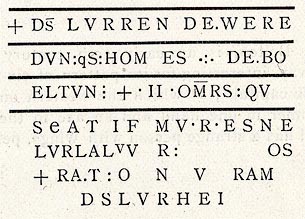 click to enlarge
click to enlargeCV1044.jpg
item:- JandMN : 190
Image © see bottom of page
item:- knight; horse
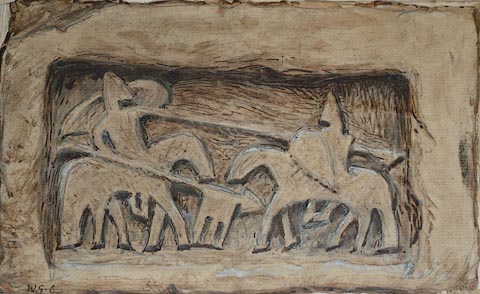 click to enlarge
click to enlargePR0856.jpg
Detail of a bas relief; two mounted knights face each other with lances raised. The panel is Norman.
Drawn to illustrate Notes on the Early Sculptured Crosses, Shrines and Monuments in the Present Diocese of Carlisle, by Rev William Slater Calverley, published by T Wilson, Kendal 1899; opposite p.58.
initialled at bottom left:- "W.G.C."
item:- Tullie House Museum : 1902.18.40
Image © Tullie House Museum
| Beck, Nathaniel | 1663 - |
| Wayte, Robert | 1668 - |
| Wright, Christopher | 1687 - |
| Breeks, John Hanson, James | 1692 - |
| Sommers, Joseph | 1724 - |
| Hudson, Daniel | 1728 - |
| Castley, Thomas | 1729 - |
| Alderson, George | 1731 - |
| Smith, Thomas | 1739 - |
| Blamire, Thomas | |
| Kilner, William | 1748 - |
| Stokoe, Hugh | 1753 - |
| Tickel, Joseph | 1754 - |
| Earl, John | 1758 - |
| Kilner, Thomas | 1768 - |
| Walton, John | |
| Rumney, William | 1776 - |
| Jackson, John | 1795 - |
| Jackson, Edward | 1799 - |
| Shepherd, William | 1834 - |
| Hughes, William Henry | 1872 - |
| Dobson, John | 1873 - |
| Dowding, Charles | 1876 - |
| Stoate, William Morgan | 1878 - |
| Pinnington, Philip | 1880 - |
| Burn, Robert | 1891 - |
| Suttie, John Trail | 1895 - |
 scratch dial
scratch dial sundial
sundial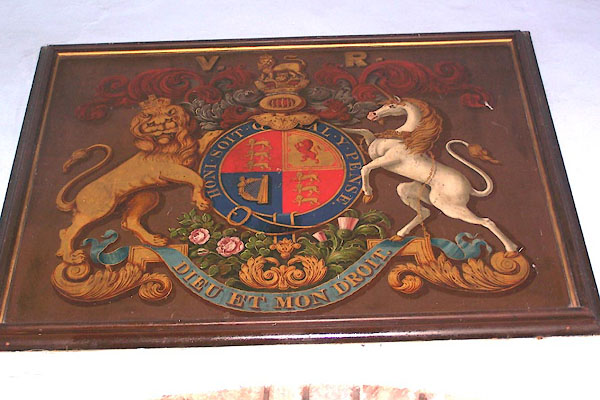
BME06.jpg Coat of arms, Victoria.
(taken 30.5.2006)
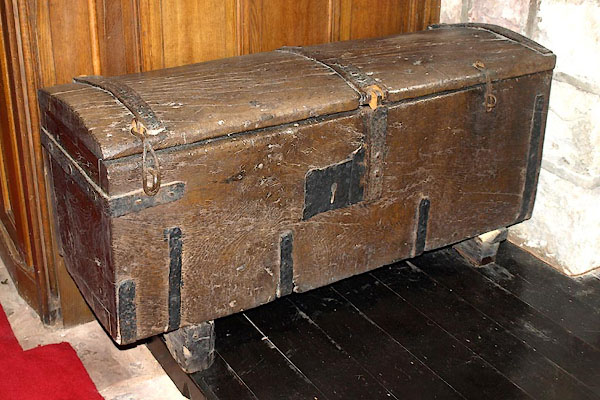
BRE51.jpg Chest.
(taken 3.8.2009)
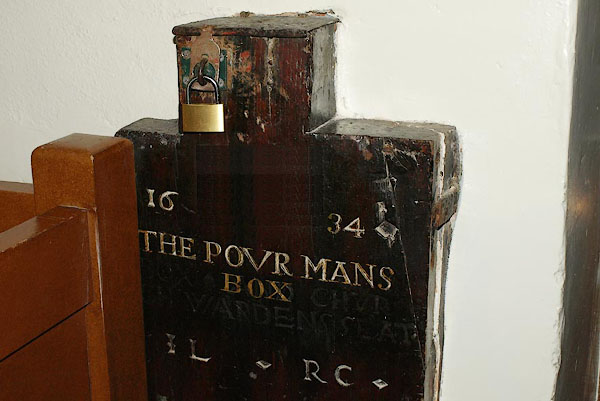
BRE53.jpg Poor box:-
"16 34 / THE POUR MANS / BOX / IL RC" (taken 3.8.2009)
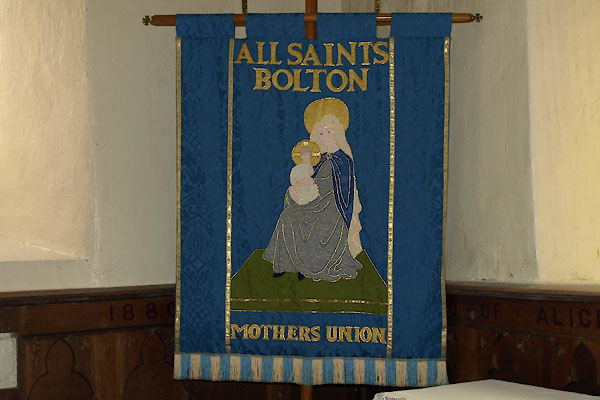
BXF07.jpg Mothers Union banner
(taken 3.8.2009)
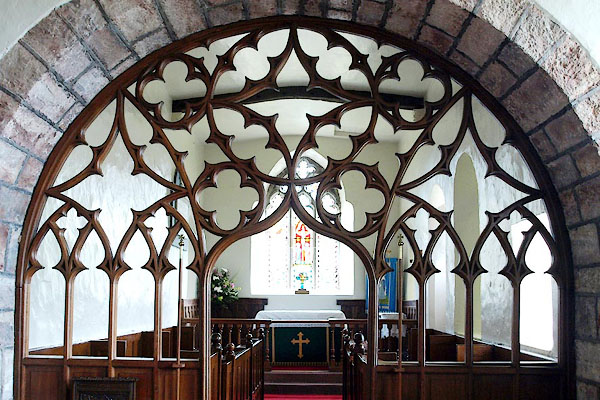
BRE52.jpg The screen.
(taken 3.8.2009)
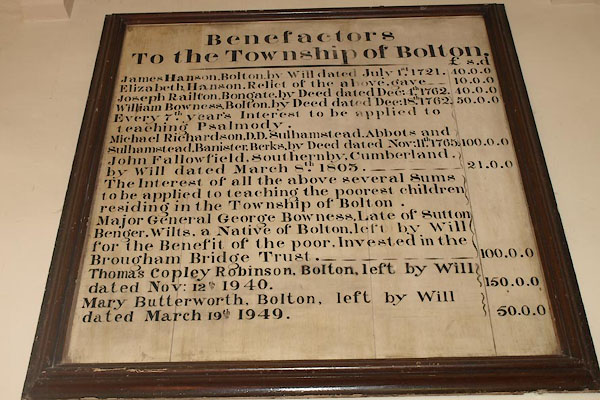
BXF06.jpg Painted board, charities.
(taken 31.8.2012)
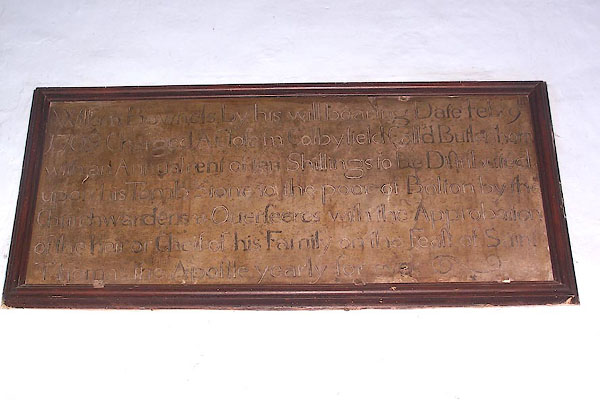
BME05.jpg Painted board:-
"William Bowness by his Will bearing Date Feb 9th 1709 Charged a Close in Colbyfield Call'd Butlershorn with an Annual rent of Ten shillings to be Distributed upon his Tomb Stone to the poor of Bolton by the Churchwardens &Overseeres with the Approbation of the heir or Cheif of his family on the Feast of Saint Thomas the Apostle yearly for ever." (taken 30.5.2006)
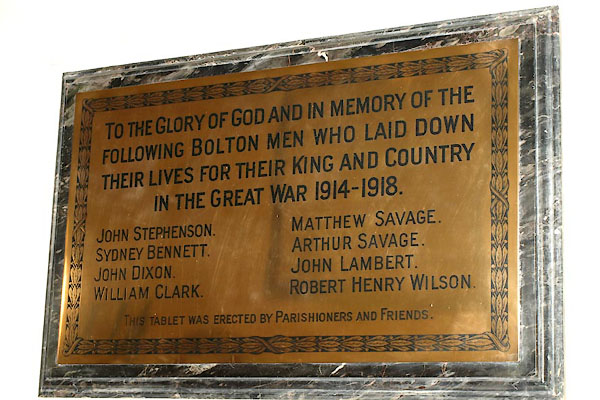
BXF08.jpg War memorial plaque.
(taken 31.8.2012)
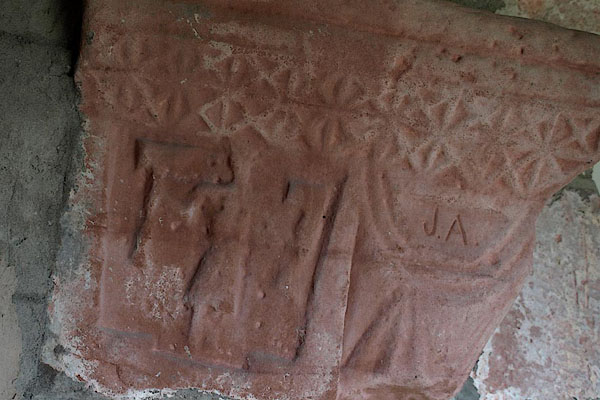
BRE49.jpg Left capital of the door arch: figure with a hammer and an axe.
(taken 3.8.2009)
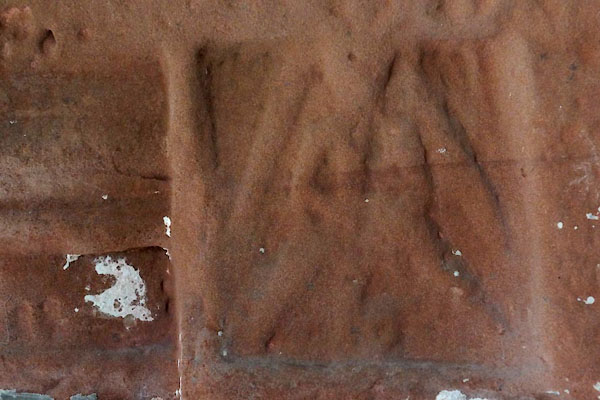
CAD14.jpg Right capital of the door arch.
(taken 21.3.2014)
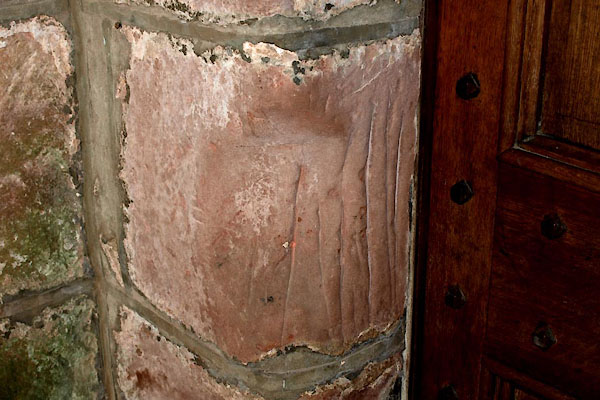
BXF05.jpg Sharpening marks on the door.
(taken 31.8.2012)
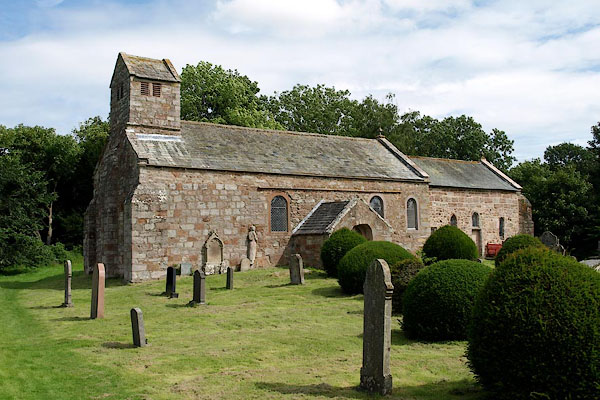
BRE54.jpg (taken 3.8.2009)
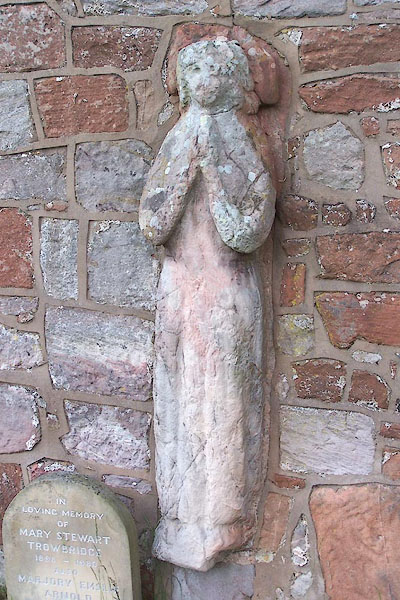
BME08.jpg Effigy of a lady, perhaps taken off a 12th century tomb.
(taken 30.5.2006)
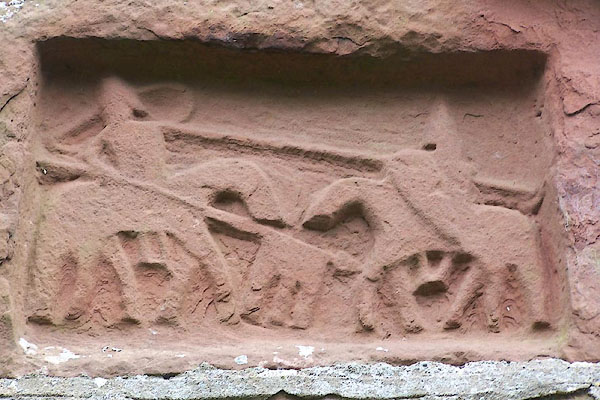
BME09.jpg Carved sandstone plaque on the north wall, knights jousting. They are wearing mail and pointed helmets, and carry kite shape shields and lances of late 12th century pattern.
(taken 30.5.2006)
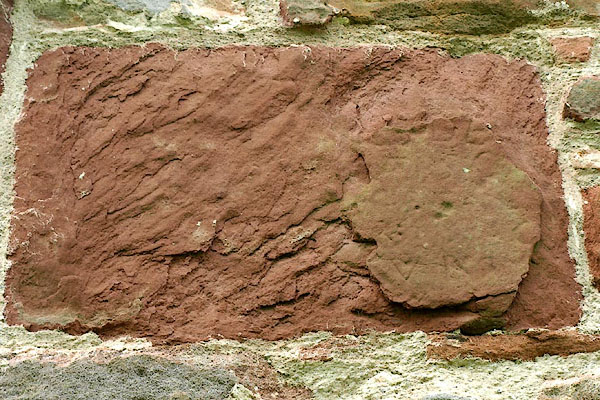
BRE50.jpg Weathered inscription. Part was:-
"BOELTUN" (taken 3.8.2009)
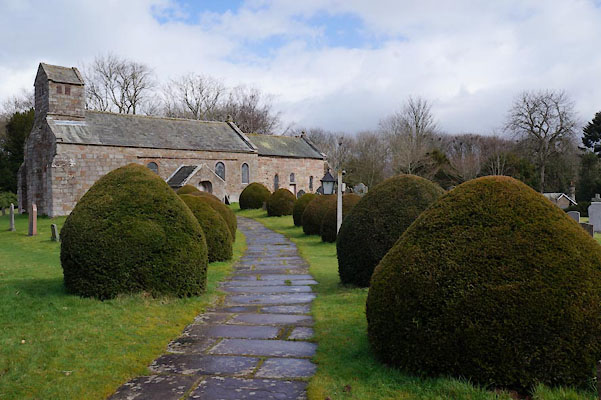
CAD05.jpg Yew bushes.
(taken 3.8.2009)
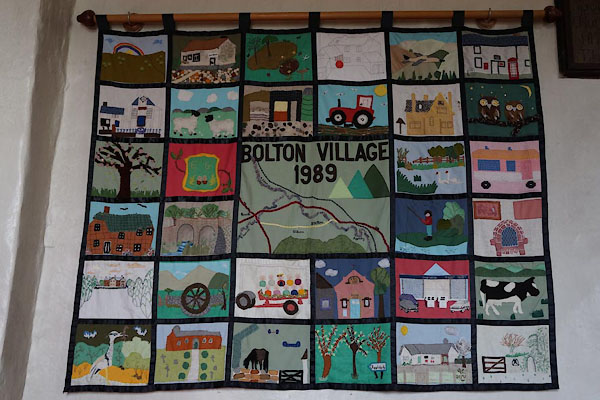
CAD06.jpg Children's banner, 1989.
(taken 21.3.2014)
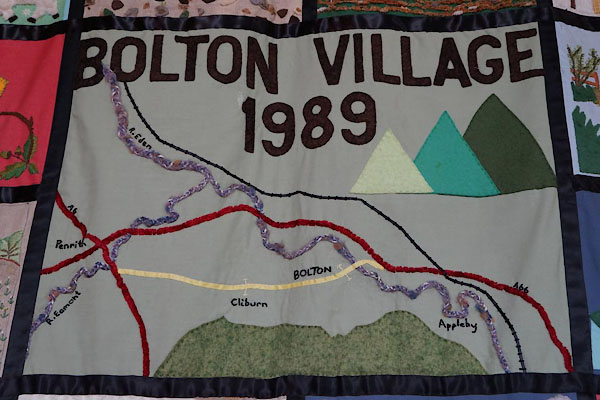
CAD07.jpg Banner, map.
(taken 21.3.2014)
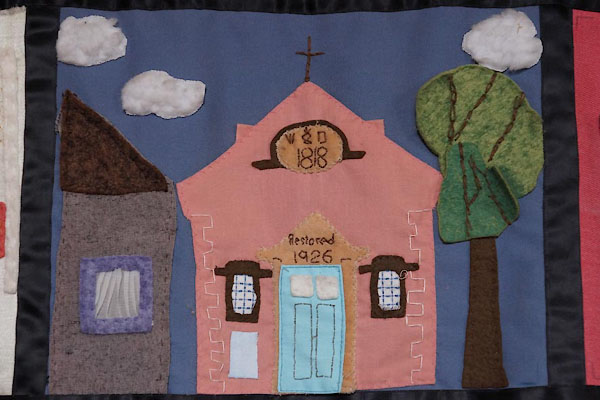
CAD08.jpg Banner, detail.
(taken 21.3.2014)
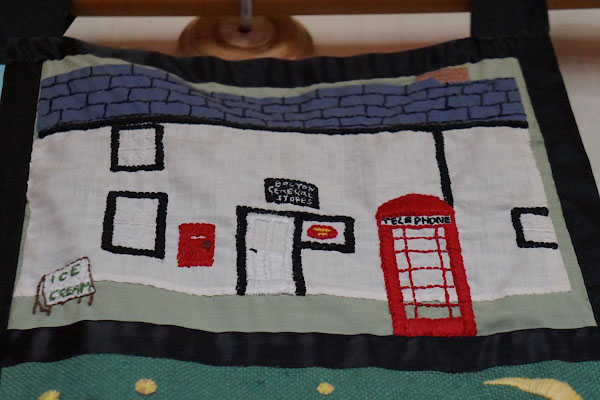
CAD09.jpg Banner, detail.
(taken 21.3.2014)
